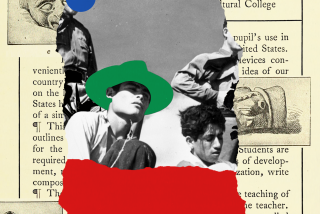School textbooks should be inclusive
- Share via
Re “The fallacy of feel-good history,” Opinion, May 16
I am a bit more comfortable with textbook publishers giving a “feel-good,” inclusive, egalitarian, even pride-inducing history than with Diane Ravitch’s version of history in which she would instill humility and a recognition of folly in the “pressure groups” she cites. A textbook is a starting place for young scholars, and it can be taught as such, not as the official history or the final word.
As for the dull writing, I would think the state Board of Education is able to influence that a bit. Do inclusiveness and sensitivity preclude drama and engaging narrative?
STEVEN SITTIG
San Dimas
*
Ravitch worries that, with California’s requirements that history texts portray all segments of the population equally rather than focusing exclusively on rich white men, the history being taught will become “inaccurate and dishonest.”
I presume she must mean relative to the texts of my childhood -- the ones that taught us how Columbus “discovered” America, how European immigrants “settled” the continent, how Abraham Lincoln single-handedly freed the slaves (who didn’t really have it that bad) and how that nice man Woodrow Wilson one day decided to let women vote.
If California requires future historians to remind us that real history is made by the heroic struggles of real people of all sexes, ages, religions, races, incomes, sexual orientations and ability levels, this will be a vast improvement.
STACY BERMINGHAM
San Diego
More to Read
Sign up for our Book Club newsletter
Get the latest news, events and more from the Los Angeles Times Book Club, and help us get L.A. reading and talking.
You may occasionally receive promotional content from the Los Angeles Times.










